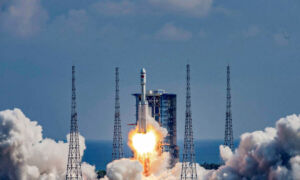US Adds 7 Chinese Aerospace Entities to Export Control List Over Chinese Military Ties
The Commerce Department announced on Aug. 23 that it has added seven Chinese entities to the economic blacklist over their roles in weaponizing U.S. technology to bolster the Chinese military.The targeted entities are state-owned aerospace and technology corporations, including China Aerospace Science and Technology Corporation 9th Academy 771 and 772 Research Institute, China Academy of Space Technology 502 and 513 Research Institute, China Electronics Technology Group Corporation 43 and 58 Research Institute, and Zhuhai Orbital Control Systems, according to a notification posted to the Federal Register. The seven entities were accused of “acquiring and attempting to acquire US-origin items in support of the People’s Republic of China’s (PRC) military modernization efforts.” “U.S. technologies that support space and aerospace activities should not be used to support the PRC’s military modernization,” Under Secretary of Commerce for Industry and Security Alan Estevez said in the statement. “China’s military-civil fusion program requires BIS [Bureau of Industry and Security] to be vigilant and act forcefully when necessary to protect our sensitive technologies.” Military-civil fusion (MCF) refers to a state-led strategy that seeks to harness civilian-developed research and technology to aid China’s military modernization, thus blurring the line between civilian and military sectors. Chinese soldiers from the People’s Liberation Army wear protective masks as they march after a ceremony marking the 70th anniversary of China’s entry into the Korean War, in Beijing, China, on Oct. 23, 2020. (Kevin Frayer/Getty Images) With this strategy, the Chinese Communist Party (CCP) seeks to achieve its regional and global ambitions by developing the most technologically advanced military in the world, the U.S. State Department said in a report (pdf). “The CCP is implementing this strategy, not just through its own research and development efforts, but also by acquiring and diverting the world’s cutting-edge technologies–including through theft—in order to achieve military dominance,” the State Department said. The new trade ban came after the Commerce Department blacklisted seven Chinese supercomputing entities in April over their roles in “building supercomputers used by China’s military actors, its destabilizing military modernization efforts, and/or weapons of mass destruction programs.” The latest additions mean the United States has added approximately 600 Chinese entities to the Commerce Department’s “entity list.” Companies on the list are barred from accessing U.S. materials or services without a special license. “Technology is value neutral, and that’s why we exercise constant vigilance with respect to China, particularly in sectors like aerospace, where the potential for diversion to military applications is so high,” said Assistant Secretary of Commerce for Export Administration Thea D. Rozman Kendle. Follow Dorothy Li is a reporter for The Epoch Times based in Europe.

The Commerce Department announced on Aug. 23 that it has added seven Chinese entities to the economic blacklist over their roles in weaponizing U.S. technology to bolster the Chinese military.
The targeted entities are state-owned aerospace and technology corporations, including China Aerospace Science and Technology Corporation 9th Academy 771 and 772 Research Institute, China Academy of Space Technology 502 and 513 Research Institute, China Electronics Technology Group Corporation 43 and 58 Research Institute, and Zhuhai Orbital Control Systems, according to a notification posted to the Federal Register.
The seven entities were accused of “acquiring and attempting to acquire US-origin items in support of the People’s Republic of China’s (PRC) military modernization efforts.”
“U.S. technologies that support space and aerospace activities should not be used to support the PRC’s military modernization,” Under Secretary of Commerce for Industry and Security Alan Estevez said in the statement.
“China’s military-civil fusion program requires BIS [Bureau of Industry and Security] to be vigilant and act forcefully when necessary to protect our sensitive technologies.”
Military-civil fusion (MCF) refers to a state-led strategy that seeks to harness civilian-developed research and technology to aid China’s military modernization, thus blurring the line between civilian and military sectors.

With this strategy, the Chinese Communist Party (CCP) seeks to achieve its regional and global ambitions by developing the most technologically advanced military in the world, the U.S. State Department said in a report (pdf).
“The CCP is implementing this strategy, not just through its own research and development efforts, but also by acquiring and diverting the world’s cutting-edge technologies–including through theft—in order to achieve military dominance,” the State Department said.
The new trade ban came after the Commerce Department blacklisted seven Chinese supercomputing entities in April over their roles in “building supercomputers used by China’s military actors, its destabilizing military modernization efforts, and/or weapons of mass destruction programs.”
The latest additions mean the United States has added approximately 600 Chinese entities to the Commerce Department’s “entity list.”
Companies on the list are barred from accessing U.S. materials or services without a special license.
“Technology is value neutral, and that’s why we exercise constant vigilance with respect to China, particularly in sectors like aerospace, where the potential for diversion to military applications is so high,” said Assistant Secretary of Commerce for Export Administration Thea D. Rozman Kendle.













